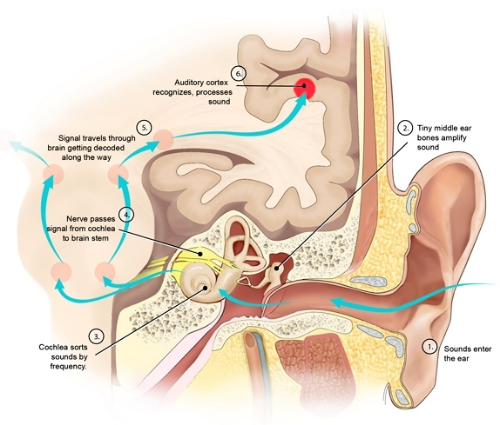

They tend to absorb information in a more efficient manner through sounds, music, discussion, teachings, etc. What is an aural learner? An aural learner (auditory learner) are very good listeners. Distinctive atmosphere or quality associated with something.Īural Learner. What’s the noun for aural? Here’s the word you’re looking for. As these meanings imply, these two words refer to two of the most basic skills in language learning: aural skills and oral skills. The main difference between aural and oral is that aural refers to the ear or hearing whereas oral refers to the mouth or speaking. Although aural and oral are homophones, they have totally contrary meanings. What is the difference between the words ‘aural’ and ‘oral? Attend lectures and tutorials regularly Use mnemonics, rhymes, jingles, and auditory.
#AURAL VS AUDITORY WINDOWS#
If it’s related to something spoken or to the mouth, it’s oral. Sit away from doors or windows where noises may enter the classroom. Something verbal is expressed in words, either spoken or written. It contains a variety of neurovascular structures, including the axillary artery, axillary vein, brachial plexus, and lymph nodes.Īural refers to the ear or hearing, and oral to the mouth or speaking. The axilla is an anatomical region under the shoulder joint where the arm connects to the shoulder. What is the area below the armpit called? The loudness of the complex aural stimulus is defined as the attribute of auditory sensation in terms of which sounds may be ordered on a scale extending from soft to loud (Harris, 1991). The main difference between oral and verbal is that verbal means relating to or in the form of words whereas oral means spoken rather than written. What is difference between orally and verbally? The reason for this is obvious, since it would be illogical to ad- dress students in a language which they supposedly cannot understand in its oral form. The aini of a course in Aural Comprehension can best be described as the gradual improventent of the student’s ability to understand a language in its spoken form. They may also read things out loud to help better understand the material. Typically, aural learners prefer to listen to lectures rather than take notes. “The aural learning style is a style in which individuals learn best through hearing directions and speaking answers. Taken as a whole, the audible component of brand experience everything a customer hears when interacting with a given company. In the following sentence, aural and auditory could be used interchangeably. Aural or Auditory Learners learn best when they are able to work while listening to various sounds and/or music. Auditory refers to sound or the sense of hearing, but not the ears themselves. It’s important to distinguish aural from auditory, a similar adjective. What is difference between aural and auditory?Īural is an adjective that means related to ears or the sense of hearing. What is the difference between the words ‘aural’ and ‘oral?.What is difference between orally and verbally?.What is difference between aural and auditory?.There are things that you and other people can do to help with your APD. For deaf children to develop their hearing capacity to the full, they need to grow up and learn in a place where listening and talking. Things you can do to help with auditory processing disorder (APD) To reduce background noise, school children with APD may be advised to wear a wireless earpiece that connects to a tiny microphone worn by their teacher. You can do it with a hearing specialist or in your own time online. When someone has aural atresia, there is a high incidence of malformation of the external ear and middle ear also, but the inner ear and auditory nerve are. Treatment usually involves activities to improve listening and concentration. There is no cure for APD but there are things that can help. Treating auditory processing disorder (APD) Testing for APD is not usually done on children under 7 years old. Aural is applicable to any sensation or impression which affects the auditory sense rather than other senses. memory, problem-solving and concentration tests AURAL/AUDITORY LEARNERS Auditory learners form connections through sounds such as words or music. Aural, auricular, audible mean heard or perceived by the ear but they are not often interchangeable.having electrodes on your head to measure how your brain reacts to sound.Tests for auditory processing disorder (APD) The GP may refer you to a hearing specialist. you or your child find it hard to hear or understand speech The most effective aural rehabilitation plans use a combination of hearing aids, assistive devices, communication strategies and auditory training.


 0 kommentar(er)
0 kommentar(er)
